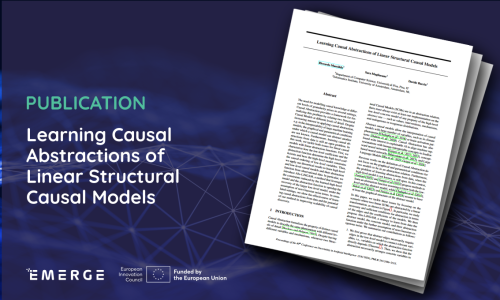15 July 2024


The need for modelling causal knowledge at different levels of granularity arises in several settings. Causal Abstraction provides a framework for formalizing this problem by relating two Structural Causal Models at different levels of detail. Despite increasing interest in applying causal abstraction, e.g. in the interpretability of large machine learning models, the graphical and parametrical conditions under which a causal model can abstract another are not known. Furthermore, learning causal abstractions from data is still an open problem.
In this work, EMERGE partners from the University of Pisa tackle both issues for linear causal models with linear abstraction functions. First, the authors characterize how the low-level coefficients and the abstraction function determine the high-level coefficients and how the high-level model constrains the causal ordering of low-level variables. Then, they apply their theoretical results to learn high-level and low-level causal models and abstraction function from observational data.
Read the paper in the link below.


